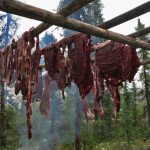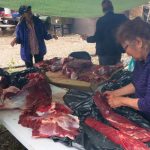|
Dave: |
Dénhtʼā? |
|
|
How are you? |
|
|
|
|
Ernie: |
Estīe. Síkʼādé gísdah. |
|
|
Iʼm fine.-Still-I am walking around. |
|
|
I’m fine. I’m still walking around. |
|
|
|
|
Dave: |
Ną́ʼ etsén netsʼį̄́ʼ łâsʼą̄ł. |
|
|
Here (handing)-meat-to you-I brought. |
|
|
I bought you some meat. Here (handing). |
|
|
|
|
Ernie: |
Łą̄́ sṓgá sínlā́ʼ! |
|
|
Really-good-you made me |
|
|
Thank you so much! |
|
|
|
|
|
Dénhtʼā? |
|
|
How are you doing? |
|
|
|
|
Dave: |
Eschénéʼ dedī́h kedātséné gísgeh yéh, kolā estīe. |
|
|
My back-sore-moose meat-I pack-with,-finally-Iʼm good |
|
|
My back is sore from carrying moose meat, but I’m fine. |
|
|
|
|
Ernie: |
Dáhyigé kedā senʼū́nā? |
|
|
Where-moose-you shot? |
|
|
Where did you shoot the moose? |
|
|
|
|
Dave: |
Ahdigé Tūchō gāgáh gísgehī, Big Eddy gīyéhdī kū́hyigé kedā sesʼū́n. |
|
|
Upstream-Big Water (Frances River)-beside-I went by boat, Big Eddy they call it-up there-moose-I shot. |
|
|
I went up the river. I shot it by Big Eddy. |
|
|
|
|
Ernie: |
Tū kī́līnī gūtsʼį̄h dū́gūnehsā́d-am? |
|
|
River-from-far-question? |
|
|
Was it far from the river? |
|
|
|
|
Dave: |
Endū́é, dūłą̄́ dū́gūnehsā́t. |
|
|
No,-not-far. |
|
|
Not that far. |
|
|
|
|
|
Kedā kūgūsdehī łâgolī īyéh sesʼū́n. |
|
|
Moose-I called-it arrived on all fours-then-I shot it. |
|
|
I called it close to the river and then I shot it. |

